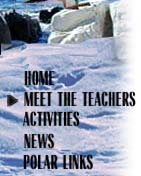
|
|
8 May, 1999
Well, this is the beginning of a wonderful and exciting journey. The
trip to the coldest, driest and highest continent, Antarctica. Actually
the journey started about two years ago when my application to the
Teacher Experiencing Antarctica/Arctic (TEA) was submitted to the
National Science Foundation (NSF) by Dr. Ira Geer. Dr. Geer is the
Director of Project Atmosphere, an American Meteorological Society
educational program of which I am a part. I found the prospect of being
a teacher in Antarctica stimulating and intriguing. Unfortunately, to my
great disappointment, I was not selected for the 1998-99 season.
Undaunted, I asked to have my application submitted again for the
1999-2000 Antarctic season. In April of 1999 I received a phone call
from Dr. Wayne Sukow of the NSF's Directorate for Education and Human
Resources (EHR). I knew as soon as I heard his name what the call was
about! I can barely describe my excitement. Now, here I at the
Arlington, Virginia headquarters of the NSF going through the initial
orientation for the TEA program. Dr. Stephanie Shipp, TEA - Antarctic
Coordinator from Rice University is leading us through the many stages
of preparation for our visit south (waaaaaaaay south!). I am just
beginning to realize what a unique opportunity I am being afforded and
the responsibility if entails. I am to serve as the eyes and ears for
all those students and others who can, for now, only vicariously journey
to the Antarctic. I hope I am up to the task.
I will be part of an exciting research teach headed by Dr. John Wrenn
for Louisiana State University (LSU) in Baton Rouge. Dr. Wrenn's team
will be studying microfossils found in sea-bottom drills cores at a
drill site off Cape Roberts on the Ross Ice shelf. In July of this year,
I will be traveling to Louisiana to work with Dr. Wrenn and his team to
learn about the project and my part in it. Until then, I will need to
study and prepare myself by reading about palynology, the study of
organic-walled micro-fossils.
I will post an update upon my return from "Down South". Until then, if
you wish to contact me and find out more about the TEA program and my
specific project, please do so via the e-mail.
Contact the TEA in the field at
.
If you cannot connect through your browser, copy the
TEA's e-mail address in the "To:" line of
your favorite e-mail package.
|
